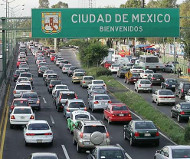2/23/2017
Study: Automobile Restrictions Did Nothing To Improve Air QualityNature study finds car use restrictions in Mexico City, Mexico failed to deliver on promised improvements in air quality.

To improve the air quality in Mexico's smog-choked capital city, the government imposed sweeping restrictions on the use of automobiles in 1989. The rules forbid use of vehicles on certain days of the week based on license plate numbers. A study published earlier this month in the journal Nature found that these measures had "virtually no discernible effect on pollution levels."
Under Mexico City's Hoy No Circula rules, drivers have to give up use of their car for one weekday out of each week. A car with a plate ending in a "5" or a "6" may not be used on a Monday, "7" and "8" are banned on Tuesdays, "3" and "4" on Wednesdays, "1" and "2" on Thursdays, and, finally, plates ending in letters or the digits "9" and "0" are banned on Fridays. Beginning in 2008, vehicles are banned from driving one Saturday each month.
Lucas W. Davis, an economist with the University of California, Berkeley, decided to measure the effect of the Saturday ban using data from monitoring stations that measured the levels of eight types of pollutants.
"The estimated impacts are close to zero and in no specification is there a visual downward shift in pollution levels when the program is expanded," Davis wrote. "These results stand in sharp contrast to ex ante estimates which predicted that the Saturday expansion would decrease vehicle emissions by 15 percent or more."
Anti-automobile activists have promoted "car free days" to improve public health under the theory that such restrictions would modify public behavior, forcing people to use the bus, subway or light rail. The Nature study found no evidence to back up this claim based upon a review of Saturday ridership data.
"Weekends are particularly interesting because travel tends to be more discretionary and with potentially more scope for drivers to substitute to lower-emitting forms of transportation like public buses, or even to zero-emissions forms of transportation like bicycles or walking," Davis explained.
Data from zoos, museums and airport parking lots showed people were not "staying home" as policymakers intended. In fact, the sharply rising number of vehicle registrations over the same period suggests drivers would buy more than one car so that they would be able to drive in the city without being hindered by the anti-driving regulations. Even those who cannot afford multiple vehicles have options.
"For households with only a single vehicle, drivers can ask for a ride from extended family, friends, and neighbors.," Davis observed. "Whether or not this ride sharing yields a net reduction in driving is not clear... Taxis are another very relevant alternative... Taxis are available everywhere in the city and are relatively cheap."
A copy of the study is available in a 850k PDF file at the source link below.


